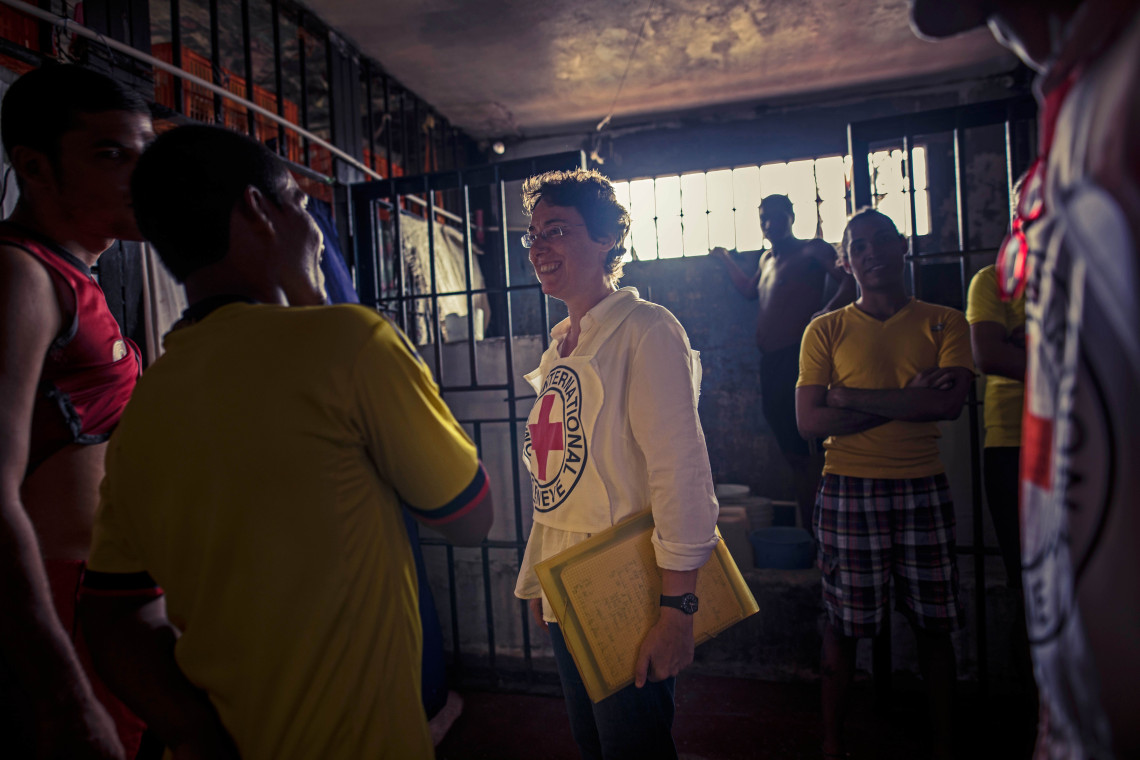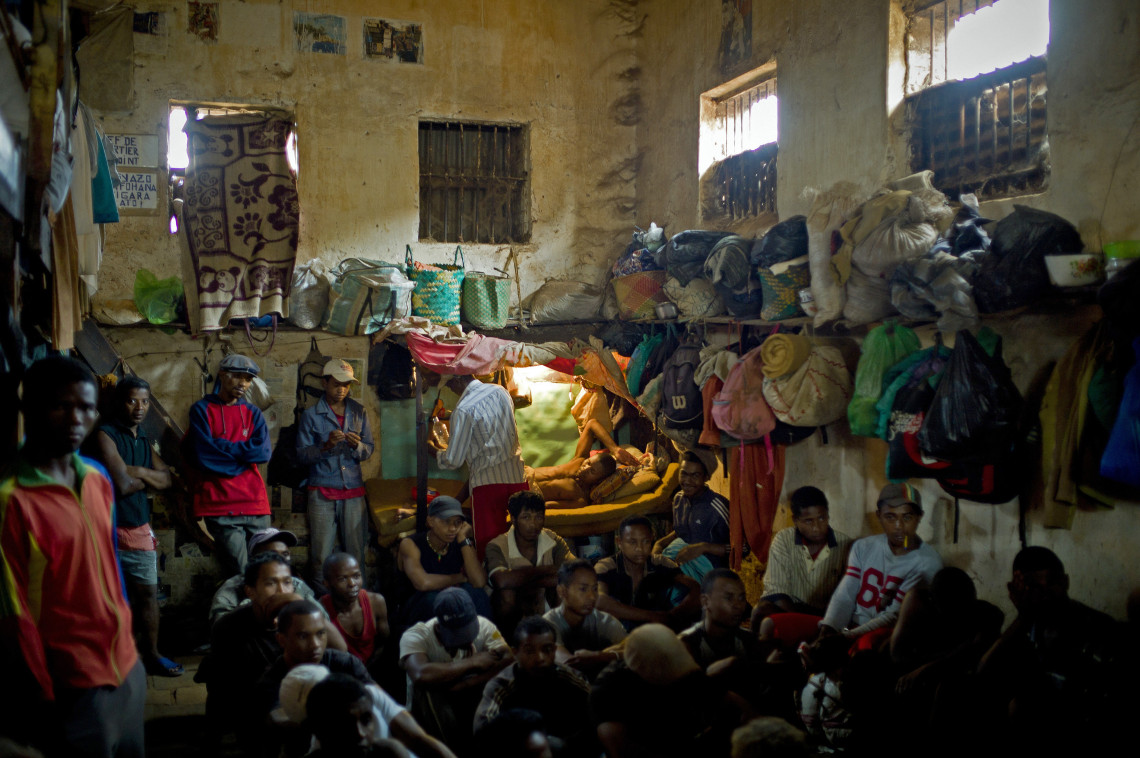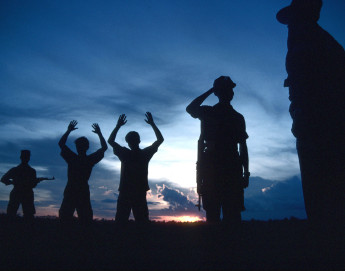
What we do for detainees
We visit detainees during armed conflicts and other situations of violence for a very simple reason: humanity. In these troubled times, the divisions and resentment that drive conflict often carry over to places of detention and deficiencies in prison life may be exacerbated.
Detainees are vulnerable to ill-treatment by their capturers and guards. Their wellbeing depends entirely on the capacities and interests of their captors, and many suffer the agony of not knowing how long they will remain in detention.
They can lose contact with their families or be subjected to inhumane living conditions, including inadequate food, water and health services.
VIDEO - Why the International Committee of the Red Cross works in prisons
Our visits aim at ensuring that the treatment detainees receive is in line with internationally recognized laws and standards and the principles of humanity. We first and foremost work to:
- prevent torture and other forms of ill-treatment;
- prevent and resolve disappearances;
- improve conditions of detention (adequate infrastructure, food, water and health services);
- restore and maintain family contact;
- ensure respect for legal safeguards.
The fact that the ICRC registered me and told my family that I was alive helped to guarantee that I would not be killed.
Dr Patricio Bustos, imprisoned in 1975 under the military dictatorship in Chile
We seek to alleviate the suffering of families, particularly by restoring communication between detainees and their relatives. In some cases, we also support former detainees, facilitating their return to society.
We have been helping detainees since 1870, traditionally focusing on people held in connection with armed conflict and other situations of violence, such as prisoners of war and civilian internees. We act as a neutral intermediary, especially during large-scale release operations.
Detainees may be in the custody of non-state armed groups. Whenever possible we try to establish a dialogue with these groups so that those under their control are treated humanely and have access to all the rights recognized by international laws and standards.
Wherever we can, we also visit people detained for other reasons, including the most vulnerable if doing so could improve their treatment and the conditions under which they are being held. Our work includes visiting detainees under the jurisdiction of international courts and tribunals.
While we pay particular attention to people held in connection to armed conflicts, our interventions – such as providing technical support and advice to the management of a place of detention, building a modern kitchen or renovating the sewage system - benefit all detainees in the places of detention in which we work.
Everyone should be treated humanely, regardless of why they are detained. #NelsonMandelaDay pic.twitter.com/0BrVNEvNxO
— ICRC (@ICRC) July 18, 2023
How do we proceed?
Regular visits to places of detention are essential to our work to help detainees. On the basis of our findings, we submit confidential reports to authorities and discuss possible solutions and, if necessary, provide assistance to the detainees.
During their visits, ICRC delegates conduct interviews with detainees in private. They note down the detainees' details so they can be followed up on subsequent visits. The detainees describe any problems of humanitarian concern they may have, and what they say is shared with the detaining authorities if - and only if - they have given their prior consent.
We refrain from taking a position on the reasons for the detainees' arrest or capture. We simply try to ensure that they benefit from the judicial guarantees to which they are entitled under international and domestic law, like being freed after completing their sentence or having access to a judge in due time.
The ICRC gave us mattresses, so we no longer sleep on chip wood. They fixed the water and now it flows, and the generator gives us electricity.
Kebede, member of the detainees committee in Dessie prison, Ethiopia
5 basic criteria for our visits to detainees
In order for the ICRC to carry out detention visits, we must be given:
- access to all detainees within a place of detention;
- access to all premises and facilities used by and for the detainees;
- authorization to repeat our visits;
- the possibility to speak freely and in private with the detainees of our choice;
- assurance that the authorities will provide the ICRC with a list of all detainees within its field of interest or authorize us to compile such a list.
Examining the whole system
We closely work with detaining authorities, maintaining a confidential dialogue with them concerning our findings. By doing so, we look not just at individual cases but also at challenges across the system that have an impact on the health and wellbeing of detainees. Our aim is to support state and non-state authorities in taking the necessary steps to ensure humane treatment and conditions of detention.
Ill-treatment is not necessarily a deliberate act of the detaining authorities. Often they simply do not have the resources needed to run the place of detention properly. And when money and staff are in short supply, access to food or adequate health care is drastically reduced. The safety of detainees and staff, malnutrition, water-borne diseases and public health concerns of all kinds become commonplace and difficult to eradicate without outside intervention.
However, whether ill-treatment is intentional or not, it must stop.
VIDEO - Malnutrition can turn a prison sentence into a death sentence
Our advice to authorities is therefore based on a thorough assessment of their detention system, including legislation, infrastructures, management practices, the food chain and the quality of health care.
Our detention-related work is based upon a comprehensive assessment of the situation both inside and outside places of detention. Out detention teams consist of protection delegates, former prison managers, specialized health staff, nutritionists, engineers, legal experts and other relevant experts in our quest for concrete solutions.

On the basis of our assessment and analysis of each situation, and through our dialogue with the detaining authorities, we develop a specific strategy to meet the needs of detainees most effectively. We seek to implement projects designed to address the systemic roots of the humanitarian problems identified that affect people deprived of liberty. As work progresses, we monitor and amend our strategy to ensure that our actions have a tangible impact on the situation of the detainees.
Our goal is not to take the place of the detaining authorities but help them in strengthening their own capacity to meet the duty of care they have for the detainees.
The legal basis for our work in places of detention
- In international armed conflicts, the Geneva Conventions recognize the right of the ICRC to visit prisoners of war and civilian internees. Preventing our delegates from carrying out their mission is a violation of humanitarian law.
- In non-international armed conflicts, Article 3 common to the four Geneva Conventions authorizes us to offer our services to parties to the conflict. Many accept our proposal to visit detainees, in part because of our well-earned reputation in this field.
- In situations that have not reached the threshold of an armed conflict, we offer to visit detainees on the basis of the Statutes of the International Red Cross and Red Crescent Movement.
From the International Review of the Red Cross - Detention: addressing the human cost
To know more, please check our blog on detention activities


